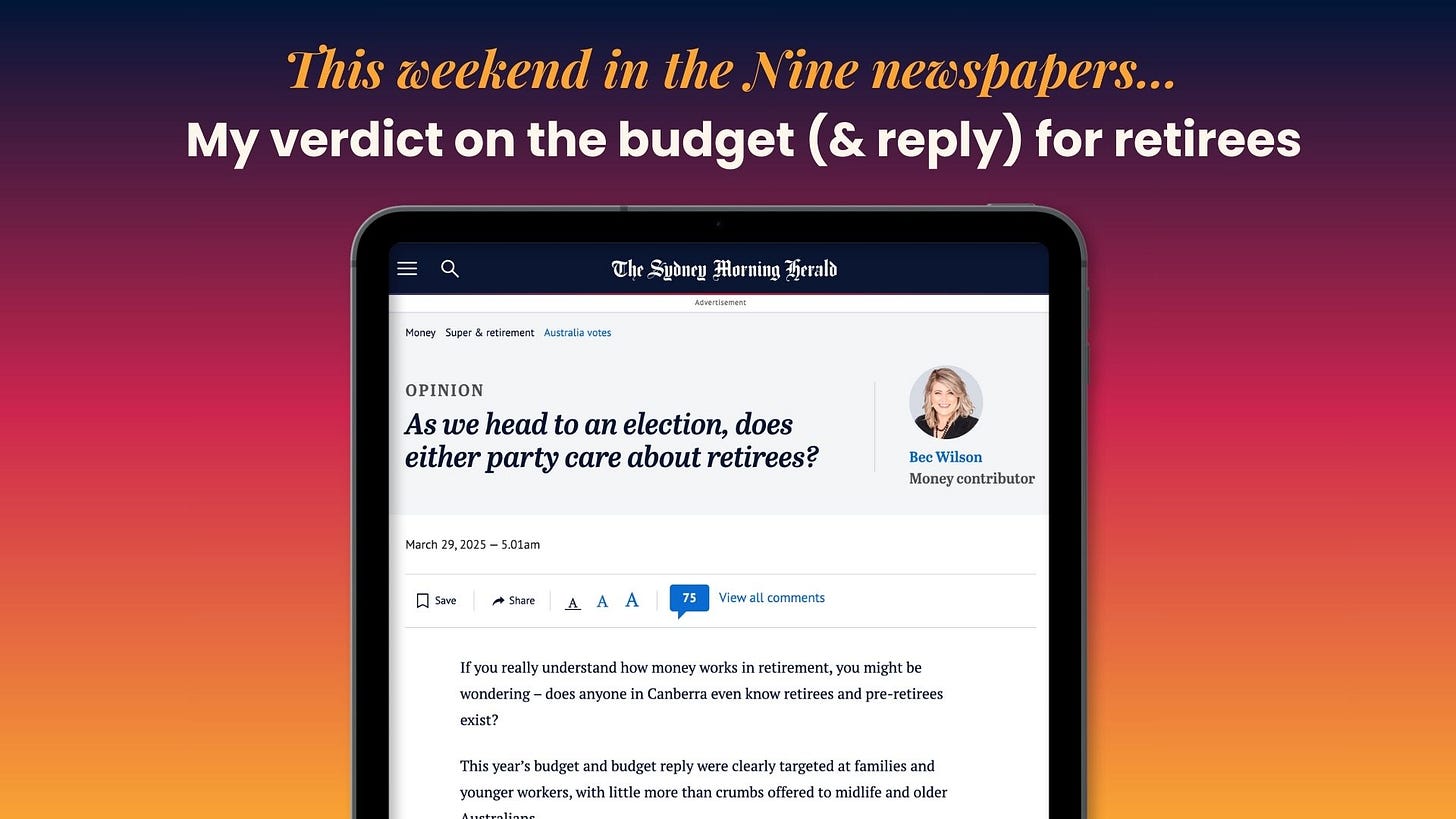Why spending in retirement doesn’t drop the way some expect
And in today's newspapers, 'As we head to an election, does either party care about retirees?'
In this week’s edition:
Newspapers: As we head to an election, does either party care about retirees?
Feature: Why spending in retirement doesn’t drop the way some expect
Podcast: April 1st is coming - time to check in on your health insurance
From Bec’s Desk: A week of travelling
Now, an important promotion for the upcoming course …
The next How to Have an Epic Retirement 6 week flagship course kicks off on the 10th April. And if you want the 25% off earlybird price then you’ll need to book in the next 48 hours. BOOK HERE | DOWNLOAD A BROCHURE
Our last course has just finished — look at some of the feedback coming in:
Thank you for your positive and vibrant delivery of your modules within this course. Clear, concise and to the point, that is not easy to do when you need to cover so much information to a wide audience at different levels of their Epic Retirement. Well Done and Thank you. Your passion to help inform people on all the important topics have been invaluable and the knowledge I have learnt will certainly prepare me for my Epic Retirement.
The course is amazing. Well structured, great content, Bec is very clear and it is easy to understand her message. There is so much to take in, very happy that we also have the workbook and paperback version to take and make notes as we go.
Great course. Bec you are really offering an amazing service. Thank you. I love your entrepreneurial bent is also providing such a helpful service.
The course is interesting and well designed and the concepts clearly articulated. Picked up interesting facts from Q&A sessions too.
Why spending in retirement doesn’t drop the way some expect
And why that’s not necessarily a bad thing
One of the biggest myths in retirement planning is that your spending will magically drop the moment you stop working.
Some in the retirement industry will even tell you that your expenses should fall to 80% of your pre-retirement budget almost overnight. But today I want to give you a different perspective—especially if you’re part of the new generation of retirees who want more from retirement.
There’s a long-held idea that once the mortgage is paid, the kids have left home, and the office clothes are packed away for good, your cost of living will shrink dramatically.
And sure, for some people, that happens. But here’s the truth that doesn’t get talked about enough: for many others, spending doesn’t drop—it just shifts. And often, what it shifts toward is a whole lot more epic.
I call it your epic experiences budget. It’s the part of retirement spending that isn’t about your basic needs—it’s about living well. And if you don’t factor it into your planning, you might find yourself short on fun, not just funds.
Retirement doesn’t shrink your spending. It shifts it.
There are plenty of things you stop spending on when you leave work. The daily commute. Takeaway lunches at your desk. Expensive work clothes. The Friday night drinks you were too tired to enjoy anyway.
But once you have more time and more freedom, you start spending in new ways. And those ways often bring more joy, connection, and meaning. Here’s what we often see:
Travel spending takes off.
The first 5 to 10 years of retirement are often the most active. People start ticking off wish lists—walking the Camino, seeing the Kimberley, caravanning around Australia, or taking that long-awaited Europe trip. Even smaller, regular adventures—weekend getaways or visits to the grandkids—can add up quickly.
More spare time = more discretionary spending.
When you’ve got time, you say yes to things you enjoy. You might join a wine club, take up a hobby, go to concerts or festivals, or do that $1,000 course you've always been curious about. Time creates space for spontaneity—and that can come with a price tag.
Helping loved ones becomes a new priority (if you can afford it).
Many people in their 60s and 70s choose to support their families—helping with school fees, gifting cash for a home deposit, or paying for a family holiday. It’s not expected, but it’s part of the way some people want to spend their money: generously.
Comfort, convenience, and quality of life start to matter more.
You might decide to pay for a cleaner, upgrade appliances, or renovate instead of downsizing. For those who can afford it, spending isn’t about indulgence—it’s about easing into this new chapter with more comfort and less stress.
Of course, not everyone can afford all of these things.
But that’s exactly why it’s worth talking about—because even if you can’t do everything, you might still want to do something. And planning for joy, at whatever scale is realistic, helps you avoid being caught off guard.
So why are we still planning as if we’ll spend less?
The idea that retirement equals frugality is outdated. It’s based on a different era—when people worked until 65, lived until 75, and moved through a single, slower retirement phase. And most people back then were dependent on the age pension.
But today? Retirement is more like a series of life stages.
You’ve got your prime time years, often before you fully retire. Then come your epic retirement years—the active, energetic phase when travel and fun take centre stage. After that come the ageing years, where things slow down a little, followed by the frailty phase, where support becomes the priority.
Each stage has its own spending pattern. And that’s why a flat, fixed number doesn’t make much sense anymore.
Here’s how to plan for your epic goals:
Be honest with yourself about your lifestyle goals.
Retirement isn’t about cutting back—it’s about living well on your own terms, (and living within your means). Start with your vision, not a generic budget spreadsheet.
Model your spending in stages.
Think of your retirement in 5- to 10-year blocks. Your travel budget at 65 will likely look very different from your needs at 80.
Build flexibility into your retirement income.
Whether it’s super drawdown, investments outside of super, or part-time work, the more flexible your income, the easier it is to say yes to the moments that matter.
Stop guilt-tripping yourself for spending on joy.
This is exactly what you saved for. Joy isn’t a luxury—it’s part of a life well lived.
Your epic retirement isn’t about spending recklessly—it’s about spending intentionally, on the things that bring you joy and connection.
Plan for the kind of retirement that reflects you—not the version someone else predicted you’d need.
I kicked off the week with our final live Q&A for the Autumn Edition of the How to Have an Epic Retirement Flagship Course on Monday night. It was an absolute ripper—an energising session all about travel and getting amazing value on your adventures, featuring the fabulous Fiona Dalton.
After that, my week was mostly spent in Melbourne, filming course content and then making podcasts in the Nine studios. A joy to do!
My little 12-year old puppy continues to make progress — so we’re hopeful he’ll get his mobility back soon.
And now, in the week ahead I’m packing our welcome packs for the How to Have an Epic Retirement Flagship Course for Winter — which kicks off on the 10th April. Not long now! And off to Byron Bay for a corporate event too. The earlybird 25% off ends Monday. Make sure you lock in your place. More information here:
And don’t forget — you can book for a couple with just one ticket and just buy an extra workbook on the way through so you can each still work through your dreams as individuals, alongside each other.
This week on the Prime Time podcast we focussed on health insurance — given everyone’s premiums are due for a price rise on 1st April; and depending on your policy, the increase could be even higher. So I sat down with Sally Tindall from Canstar for a discussion to explain health insurance and what you need in this phase of life.
Got some thoughts about the topics this week — leave a comment or write me an email. I love to hear from you!
You can always email me at bec@epicretirement.com.au.
Many thanks! Bec Wilson
Author, podcast host, columnist, retirement educator, and guest speaker
As we head to an election, does either party care about retirees?
Extract of article published in print in The Age, The Sydney Morning Herald, Brisbane Times, WA Today on Sunday 30th March 2025.
If you really understand how money works in retirement, you might be wondering – does anyone in Canberra even know retirees and pre-retirees exist?
This year’s budget and budget reply were clearly targeted at families and younger workers, with little more than crumbs offered to midlife and older Australians.
Despite making up more than 50 per cent of the voting public, older Australians once again got treated like a bolted-on voting bloc. Taken for granted. Overlooked. Politically invisible.
Let’s unpack what’s on the table, what’s missing, and whether either side has really shown up for the generations who built the economy and are now trying to retire with dignity. And let’s remember – with the election only announced this week – there’s still time for the major parties to step up and serve older generations better. It could be the difference required to gain the balance of power.
1. Tax cuts: nice headline, but most retirees won’t see a cent
There’s a lot of talk about “everyone” getting a tax cut in the Labor budget and legislation subsequently rushed through. But here’s the truth: You only benefit if you’re paying tax. And most retirees don’t.
As always, if you’re trying to retire with dignity and independence, you’re expected to just figure it out.
In practice, many self-funded retirees, and most full-rate (and many part-rate) pensioners pay no tax at all. That’s thanks to the tax-free nature of retirement income streams from superannuation, and the tax-free threshold plus offsets like the Seniors and Pensioners Tax Offset (SAPTO) and the Low Income Tax Offset (LITO), which lift the effective tax-free thresholds to above the age pension.
And let me tell you – that doesn’t mean ‘they’re loaded’ or don’t feel the pinch from the cost of living rising.
So unless you’re earning additional taxable income – from part-time work, rent, or super in accumulation phase – you won’t benefit from tax cuts Labor has promised for 2026 and 2027 at all. For many retirees, this is just another headline that sounds good but means nothing in reality.
2. Deeming rate freeze: one quiet win (for now)
Labor’s decision to freeze deeming rates until 30 June 2025 is a meaningful win for pensioners with financial assets. Deeming is how Centrelink guesses the return you’re earning on your savings, and it affects how much pension you get if you’re assessed using the income test.
The rates are still artificially low (0.25 per cent and 2.25 per cent) – so retirees with term deposits and shares are being assessed as earning far less than they actually are. And that keeps more of their pension intact. This move helps around 450,000 pensioners.
The concern? The Coalition hasn’t yet said if they’ll match it. In an environment where retirees are already stretched, letting deeming rates rise could quietly strip away hundreds – or thousands – of dollars a year from people who’ve done the right thing and saved to fund their own retirements – that would be a tough break and one I’m sure many would like to know about before the election.
3. Fuel excise: short-term sugar hit, not real reform
Peter Dutton’s promise to halve the fuel excise for 12 months sounds appealing – it could save around $750 a year for single-car households, and up to $1500 for those with two vehicles. But it’s a blunt instrument.
Many older Australians drive less as they age, or they’ve already downsized to hybrid or electric vehicles, and if that’s the case, they won’t benefit at all.
Again, this sounds nice in theory, but in practice, it risks feeling like yet another hip pocket headline grab aimed at families, while they’re once again sidelined when it comes to direct benefits for their own cost-of-living pressures.
4. Medicare and medicines: small wins, but the system is still straining
The government boosted bulk billing incentives and reduced the cost of common PBS medications – which is helpful, especially for those managing chronic health conditions. And the opposition offered to match it. (READ ON… here)
Read on — this article continues in The Age, The Sydney Morning Herald, Brisbane Times and WA Today.
April 1st is coming - time to check in on your health insurance
In this episode, I sit down with Sally Tindall, Director of Data and Insights at Canstar, to unpack what the premium hikes mean and explore your options as you head into this next chapter of life.
This week on the show, we’re putting health insurance under the microscope for Prime Timers. From 1 April, premiums are set to rise by an average of 3.73%, but depending on your policy, the increase could be even higher.
To help make sense of it all, I’m joined by Sally Tindall, Director of Data and Insights at Canstar. We unpack what these increases really mean, how the pricing system works, and what your options are—especially if you’re heading into retirement or already there.
We also cover how to figure out if you're still getting value from your cover, what to watch out for in your policy, and tips to reduce costs without losing the benefits that matter most.
LISTEN TO THIS EPISODE OF THE PODCAST HERE:
Last of all, if you haven’t read the book, you can order your copy from Amazon online. Or pick up a copy at your local Big W, Dymocks, or QBD stores. And if your bookstore doesn’t have it - ask them to get it in. It’s still regularly in the Amazon Top 200.
I have a little online store where you can purchase signed copies too.














Hi Bec,
I read your articles each week. I find that the ones focussed on finance are most informative, whereas the ones focussed on lifestyle are of limited benefit.
For example, I notice that in this week’s article on retirement expenses you refer to the epic stage of retirement as one where travel & fun take centre stage.
In our case the centre stage is minding our grandchildren three days per week, and caring for / visiting my wife’s frail, elderly mother two to three days per week. These activities are born of broader family necessity. While rewarding, they are time consuming and quite exhausting.
As far as hobbies go, our main one is visiting doctors, specialists, pathology & radiology, and allied health. Although we have been proactive throughout our lives in leading healthy lifestyles, it is no guarantee of good health in later years.
We don’t have to concern ourselves with excessive discretionary expenditure, as out of pocket medical costs are high.
Don’t despair though, no other columnists mention care responsibilities for the broader family.
Best wishes, Colin
I too love your financial talk, I would love to know more about single income couples approaching retirement when the worker has 5x the non worker.